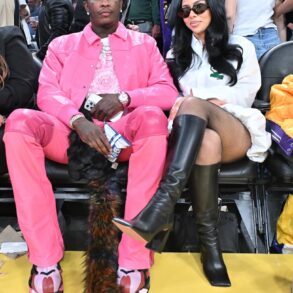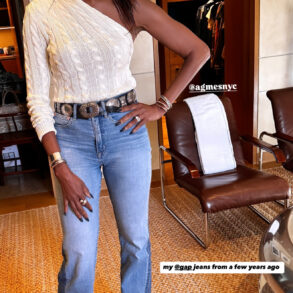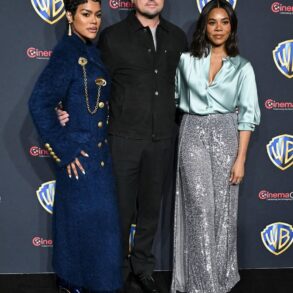“We all must make a choice — to be a hero or a villain.”
The familiarity of Morgan Freeman’s commanding voice couldn’t calm down the fans — 80,000 of them, reportedly — standing around Coachella’s Sahara Tent. The perilous tone of his monologue, paired with producer Mike Dean’s sinister synths, stressed the festival’s need for a hero. And comic book animations projected on either side of the stage illustrated there was only one man for the job.
Wearing a custom black Chrome Hearts suit, a masked Metro Boomin emerged from beneath the stage, his purple cross-embroidered cape fluttering in the desert wind. But regardless of the Academy Award-winning actor’s resounding introduction, it was the usually soft-spoken producer’s booming voice that caught festivalgoers — and one of his many guest performers — by surprise when he greeted the crowd.
“When we was done, Future kept telling me, ‘Bro, I ain’t know who the f–k was talking!’ ” Metro recalls. “ ‘I ain’t know you could do that! You be in a room and just be so quiet.’ ”
Future’s description of our hero’s usual alter-ego is true today as Metro sits at his own Boominati Studios in North Hollywood. He isn’t cloaked in his luxe costume; instead, he’s wearing a black Barriers hoodie with the image of Michael Jackson’s moonwalking silhouette highlighted by a baby blue spotlight. One of the studio’s ceiling lights floods him in the same blue as the bandanna wrapped around his tri-colored dreads.
He has gotten more comfortable in the spotlight lately. Over the last decade, Metro, 30, has transformed from a behind-the-scenes trap beat-maker to one of rap’s most in-demand producers. He has managed to take over pop music, too, and without compromising his signature sound, which is characterized by eerie synth loops, 808s, soulful samples and orchestral finishes and branded by his notorious producer tags. (“Metro Boomin want some more, n—a!”) So far, he has produced 115 Billboard Hot 100 songs, including 10 top 10 hits, among them Post Malone’s Quavo-featuring “Congratulations” and Future’s “Mask Off,” and two No. 1s, Migos’ “Bad and Boujee” (featuring Lil Uzi Vert) and The Weeknd’s “Heartless.”
But Metro’s latest solo album, Heroes & Villains — which he released Dec. 2, 2022, on Republic Records and his own label, Boominati Worldwide — continued his ascent into rarefied air: the producer-turned-successful artist. The sequel to his 2018 debut album, Not All Heroes Wear Capes, which topped the Billboard 200, and the second installment of an ongoing trilogy, Heroes & Villains built on Metro’s own cinematic universe, adding depth to his sound with more live instrumentation, like the horns on “Superhero (Heroes & Villains)” or the choral vocals on “Umbrella,” and assembling hip-hop Avengers like 21 Savage, Young Thug, Travis Scott and Don Toliver to perform their melodic and slick-tongued superpowers.
Heroes & Villains became Metro’s third No. 1 album, earning his biggest opening week yet, with 185,000 equivalent album units (according to Luminate), and its lead single, “Creepin’,” with The Weeknd and 21 Savage — a remake of Mario Winans’ 2004 R&B smash “I Don’t Wanna Know” (featuring Diddy and Enya) — spent the first half of 2023 in the Hot 100’s top 10, peaking at No. 3. Between Heroes & Villains’ No. 1 debut and Lil Uzi Vert’s Pink Tape, which topped the Billboard 200 in July, no other rap album reached No. 1 on the list, making it the longest wait in a calendar year for a rap album to lead the chart since 1993 (the year Metro was born).

Amiri sweater and jacket.
Sami Drasin
The album’s success was unsurprising to those paying attention to Metro’s creative promotion strategy for Heroes & Villains. He tapped Freeman, who narrated Metro and 21’s chart-topping album, Savage Mode II, to star alongside him in an action-packed short film directed by Gibson Hazard that also featured actor LaKeith Stanfield, Young Thug and Gunna. The clip kicked off his extensive rollout, which also involved an on-the-nose way to reveal the album’s featured artists.
A$AP Rocky had texted him one day about “this artist on Instagram that was doing all these comic book covers for hip-hop artists. And I was like, ‘Damn, this sh-t looks crazy,’ ” he recalls. “I DM’d [the artist, Alejandro Torrecilla], and I was like, ‘Yo, I’m finna start rolling my album out in three, four weeks. What if you did a cover for every artist on here and I just roll out the features that way?’ ”
The promotional efforts didn’t stop once the album was out: Metro embarked on a four-city in-store CD signing tour, debuted a live beat-making hologram of himself in Los Angeles and Miami, and projected his Heroes signal (from the cover of Not All Heroes Wear Capes) around the world (literally). “He was more in people’s face,” says Republic vp of marketing strategy Xiarra-Diamond Nimrod, who has worked with Metro since 2017. “[With Not All Heroes Wear Capes], we didn’t have as many in-store components. But this time around, we wanted him to have that interaction with [fans] and bring them into his world.”
The heightened visibility around Metro allowed the superproducer to transform into a superstar, separate from the ones with whom he regularly records. And more public-facing opportunities outside of music helped turn him into a household name: Earlier this year, he starred in and produced the music for Budweiser’s Super Bowl LVII ad and teamed up with the MLB Network for its Opening Day video, which was soundtracked by “On Time” and “Trance” from Heroes & Villains.
“That’s one of the things we discussed when we first met: Do you want to be that low-key producer who you know some of their songs but you can walk right past them today and not know who they were? Or do you want to be out and known, like Swizz Beatz, Timbaland or Pharrell [Williams]?” says his manager, Ryan Ramsey. “The numbers he’s doing on his own albums show he’s at that level where people are going to see him and say, ‘Hey, that’s Metro Boomin.’ ” Ramsey, who also manages Brandy, has represented Metro for the last two years under SALXCO, alongside the management company’s founder and CEO, Wassim “Sal” Slaiby; SALXCO vp of A&R Rahsaan “Shake” Phelps; and Amir “Cash” Esmailian through his own YCFU management company.
And while his No. 1 rap album set a high bar, getting a prime-time slot at Coachella served as the perfect climax for his rollout. “We had every intention of stealing the weekend,” Metro confidently says in retrospect.
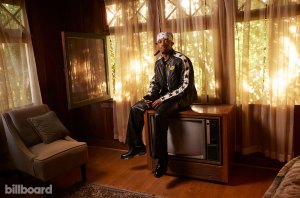
Junya Watanabe jacket, Fendi pants, Louis Vuitton shoes.
Sami Drasin
In order to pull it off, he recruited a superstar-trained team: creative director La Mar C. Taylor, who works closely with The Weeknd; show director Ian Valentine, whose creative studio Human Person (which counts Billie Eilish and Post Malone as clients) was also responsible for animation, staging, lighting and content; choreographer Charm La’Donna, who works alongside major acts from Kendrick Lamar to Dua Lipa; and his longtime recording and mixing engineer Ethan Stevens, who helped him curate the setlist. He even passed on using Coachella’s designated livestreaming crew and hired his own to ensure the quality of the video and flow of the performance for folks at home.
“There was so many people advising me, ‘Don’t spend your money on that show.’ But I was like, ‘Nah, n—s have to get this,’ ” says Metro, who remains mum about how much Coachella paid him to perform but reveals he spent “over four times” that amount to ensure it happened just as he envisioned. “People were already hearing me different with this album. But they needed to see me different now.”
While his albums have established Metro as a masterful curator, “Trochella” confirmed he was an equally skillful showman. And much like his albums, he brought out his all-star collaborators, including The Weeknd, 21 Savage and Diddy for the first live performance of “Creepin’,’’ to perform the hits they share. While he mostly flexed his superproducer muscles from behind the DJ booth, he made sure to bask in his glory from the stage, too.
As Metro’s biggest risks — like dropping an album during the holiday season or investing a small fortune in an impressive Coachella set — have continued to pay off, he credits his unwavering dedication to the art. “Over time, [I’ve] established trust between me and my listeners, [so they know] that whatever I have to offer as far as music or anything, I’m definitely putting 1,000% into it,” he says. “It’s not about, ‘Oh, look at me like a star!’ Look at me like I care.”
Growing up in St. Louis, the producer born Leland Tyler Wayne looked up to hometown hero Nelly. Country Grammar was the first explicit CD he bought, and it inspired then-literally young Metro to become a rapper. But rapping requires beats, and since he couldn’t afford any, he decided to make his own. Producing turned into a bigger passion and came with added benefits, like not having to compete with so many other aspiring rappers — and sounding like a more legitimate profession to his mother, Leslie Wayne.
Leslie played an instrumental role in getting his career off the ground: When Metro was 13, she bought him his first laptop, where he downloaded the popular music production software FL Studio. And when he was in high school, she made 17-hour round-trip drives from St. Louis to Atlanta nearly every weekend so he could work with artists he connected with over social media, like OJ Da Juiceman and Gucci Mane — while still returning home before school on Monday morning. (Leslie died in June 2022, and Metro pays tribute to her often on social media and during live performances.)
He moved to Atlanta in 2012 to attend Morehouse College but dropped out after one semester to pursue music: In 2013, he got his big break when he produced Future’s acclaimed “Karate Chop” (featuring Lil Wayne). And Metro seemed to take over hip-hop in 2015: He joined the Rodeo Tour with Travis Scott and Young Thug as a supporting act and the latter’s touring DJ; produced most of Future’s DS2 album; worked on Scott’s debut album, Rodeo; and executive-produced Drake and Future’s joint mixtape, What a Time To Be Alive.
But he experienced a career-defining moment in February 2016 when Kanye West dropped The Life of Pablo. Right before premiering it during his Yeezy 3 fashion show at New York’s Madison Square Garden, West called Metro about one of the songs he had produced, “Father Stretch My Hands, Pt. 1.” “I didn’t put that tag on that beat. It’s Kanye’s sh-t,” Metro explains. “He asked for it like, ‘I’m finna play the album, but I need the tag on the song.’ And he just threw it in there real quick.” In a now viral clip, West is seen screaming and embracing a raccoon fur trapper hat-wearing Kid Cudi before “If Young Metro don’t trust you, I’m gon’ shoot you” blasts throughout the arena’s speakers. Metro’s tag catapulted him into the pop culture zeitgeist, from the numerous memes that flooded the internet immediately after to the hype it still creates whenever a DJ plays the song at a party. “That just took it to a whole ’nother stratosphere,” he reflects.

Amiri sweater, jacket, and pants.
Sami Drasin
From there, Metro continued building relationships with other rappers and elevating their music while reinforcing his reputation as the genre’s go-to producer. “A lot of times an artist will say, ‘I want to work with you, but send me beats.’ With Metro, it’s the opposite. He wants to create with you at a very intentional level,” says Vladimir “V Live” Samedi, who began working as Metro’s tour bus driver in 2016 before he was promoted to Boominati’s head of A&R. Metro dropped collaborative projects with Big Sean, Nav and 21 Savage, the lattermost of whom Metro has worked with on three full-lengths: Savage Mode, Without Warning (with Offset) and Savage Mode II. “Metro is the greatest producer of all time. I wouldn’t be where I am today without the help of my brother,” 21 Savage tells Billboard.
With prestige, a star-studded network and a stacked production discography, Metro had all the tools he needed to fly high on his own. He launched his Boominati Worldwide label in partnership with Republic in 2017 and, the following year, released his first solo album, Not All Heroes Wear Capes, a cohesive, superstar-filled set that plays out like a movie soundtrack. His hero motif stems from a family tradition: He, his mother and his four younger siblings used to “always go see every single Marvel movie together. We done followed the whole timeline on some nerd sh-t,” he reflects. “It has always been an interest to me.”
Sony Pictures Animation, which produced 2018’s Spider-Man: Into the Spider-Verse in association with Marvel, took notice. The studio worked with Republic on the first Spider-Verse soundtrack (which yielded Post Malone and Swae Lee’s mega-smash, “Sunflower”). When the time came to work on its follow-up, Sony Pictures Motion Picture Group president of music Spring Aspers says it “was just pure luck in terms of timing” that the label had just finished working on Metro’s Heroes & Villains campaign and decided he was its “ideal partner.”
“It started off with him doing a couple songs, and then it just got to the point where I went to him and was like, ‘Yo, do you want to executive-produce this whole thing? Because it looks like I’m going to have that conversation,’ ” Ramsey recalls. “He said, ‘Man, that would be dope!’ ”
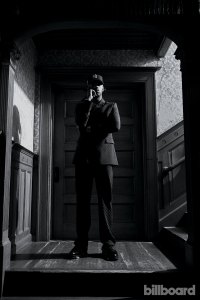
Martine Rose suit.
Sami Drasin
Metro started working on the Spider-Verse soundtrack at the end of December — the same month he released Heroes & Villains. “We’re already on a roll; might as well keep it going,” says Stevens, who also served as executive producer. Compared with the two-and-a-half years they spent working on Metro’s solo album, the duo knocked out the Spider-Verse soundtrack in six months. Metro Boomin Presents Spider-Man: Across the Spider-Verse taps a diverse web of artists — Don Toliver, Nas, Lil Wayne, James Blake, Myke Towers, Mora and more — to deliver an ingenious mix of hip-hop, pop, Latin and Afrobeats that nods to the film’s protagonist Miles Morales’ African American and Puerto Rican heritage.
“He once texted us a line that a string quartet had played,” says Phil Lord, one of the film’s co-writers and co-producers, of what became the opening sequence of “Am I Dreaming” with A$AP Rocky and Roisee, an up-and-coming St. Louis artist whom Metro discovered on YouTube years ago. “Then he had [Mike Dean] come over and do this really wild synth stuff. That became the song that’s on the end credits of the movie. And now that’s going to be the official Oscar submission for the film.”
When the time came to promote the soundtrack, Lord and Chris Miller, another one of the film’s co-writers and co-producers, took a page out of Metro’s playbook. “In the first movie, there was this phenomenon where people were making their own ‘Spidersonas,’ ” Miller says. When they saw what he did with Heroes & Villains, they tapped the film’s character designer, Kris Anka, to create Spidersonas for each of the featured artists on his soundtrack.
But they had a special plan for Metro’s own caricature. The day before Metro attended one of the Spider-Verse film screenings, Lord and Miller asked him to swing by the studio an hour early to test out some lines they had written for him. “The Republic team, our team, the music executives from Sony and the editors were crammed into another booth,” Lord recalls. When everyone cracked up after he recited, “My bad, everybody! There was somewhere to run,” Miller says they knew “that was the winner.”
Now his Spidersona — and his voice — actually appear in the film as Metro Spider-Man, but Nimrod wanted to ensure that fans would see him off the silver screen, too. “We made these cool cutouts of his character and were hanging them from light poles, and there were decals on the sidewalks and walls,” she says. “People were fully stealing these cutouts and tagging me on social like, ‘I got my Metro Spider-Man hanging in my room!’ That’s when I was like, ‘OK, now this is fire.’ ”

Amiri sweater, jacket, pants, and shoes.
Sami Drasin
Metro Boomin Presents Spider-Man: Across the Spider-Verse reached No. 1 on both the Soundtracks and Top R&B/Hip-Hop Albums charts — matching, and outperforming, respectively, the performance of the first Spider-Verse soundtrack, which also received a Grammy nomination for best compilation soundtrack for visual media. Ramsey hopes Metro’s Spider-Verse contribution can score the same distinction, and given the success of Heroes & Villains and “Creepin,’ ” next year could well be Metro’s long-awaited Grammy breakthrough. Incredibly, he has been nominated only once, and not for a project one would have expected him to have worked on: He co-produced Coldplay’s “Let Somebody Go” with Selena Gomez, from the band’s Music of the Spheres, an album of the year nominee. “[Frontman Chris Martin is] a good friend of mine. Sometimes we work on ideas; sometimes we just go walk outside,” Metro explains casually.
But with so much music to make, industry accolades are far from his mind. He’s currently wrapping up his long-awaited joint album with Future and still working on his project with J.I.D that the two teased earlier this year. Metro is also working on A$AP Rocky’s highly anticipated album, Don’t Be Dumb, and is one of a few trusted producers working on The Weeknd’s final album.
Nonetheless, there are a few other artists he dreams of collaborating with in the future. “I still really want to do something with Justin Timberlake,” he says. “I need to work with Miguel. I still haven’t worked with Jay-Z.”
But while Metro will always make time for the music, he plans to spend the next decade focused more on his businesses. Since he launched Boominati, “a lot of the business was focused on Metro and our producers that we work with: Chris XZ, Doughboy and David x Eli,” Samedi says. Now Metro is transferring his artist discovery and development skills to the executive side so he can start signing artists. And, he teases, he has already started his own production company that will allow him “to do stuff for screen.”
“The amount of grind and effort I put in my 20s into the music, I’mma put into the business aspect through these 30s,” he says. “I watched my music seeds grow from 20 to 30. I can watch the rest of these grow from 30 to 40.”
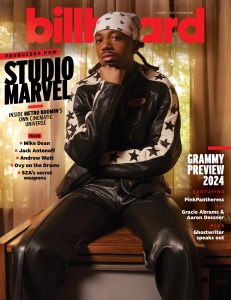
This story will appear in the Oct. 7, 2023, issue of Billboard.
This post was originally published on this site be sure to check out more of their content.




